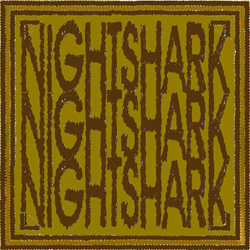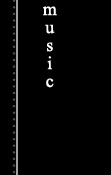




{nightshark} What will historians say about our period of music? Ten, twenty years down the road: what will be the identifying factors of today’s music? Moreover, what contemporary acts will have made the strongest impression upon the future of music? Maybe even more interesting is this question: If you were holed up in a cave for your entire life, and then set free upon the entire spectrum of instruments, what kind of music would you create? Contemplating these questions (and more) is Nightshark. And while none of the bandmates (Becca Mhalek-alto and baritone saxophones; Mike Buckley-electric guitar; Andrew Lindstrom-drums) would presume to have the answers, they are certain of a couple of things. One of those is their collective notion that there are more ways to look at music than we are currently exploiting. And, to be fair - maybe as a culture we are in need of a reeducation when it comes to music. After all, even the most eclectic of listeners deal with only a narrow range on the spectrum of sound. Proof of our limitations is the reception that an act like Nightshark has received. I dare you: stand in front of them and bellow that age-old notion that everything under the sun has already been done. And prepare yourself for one electric chair of a “no”. Sure (for most of us), if you give Nightshark a lazy listen, you will hear chaos. But if you tune in a little closer you will find they are, in fact, working adeptly amongst the complicated language of music - of timbre and melody and rhythm. For this author, a more sophisticated ear is in order (as far as most of us are concerned) to allow them in, and to understand their complex sound. Maybe I'm, not giving us bystandards enough credit. After all, our musical pedigree is steeped in repetition. In twelve bar groupings, 12-tone scales, the 1-4-5 progression, 4/4 time, etc. The turnaround and the resolve back to the root. That is - until we hear something like Nightshark. Nightshark is a group that is deliberately challenging you to admit that you know more than you do. At least, to admit that you are capable of knowing more, musically, than you may think. Don’t get me wrong – Nightshark isn’t interested in intellectualizing. That’s not what they’re out for, some kind of cerebral breakthrough. They have no lyrics. For them, the interest lies exclusively in sound. One can envision them as a trio standing before the great mystery that is all of music and prodding at it, if even just for a moment. Nightshark’s songs have purposely pushed away from the rock ‘n roll ideology of tonal resolutions. To understand Nightshark is to understand that the musical crux lies more in the rhythm, not necessarily the tonality. Basically, Nightshark is an improv trio. They do not practice together (though this does not make them sloppy). They record their shows and have a conversational precision, three unique individuals getting together for an incisive musical dialogue. Mhalek, Buckley and Lindstrom are adept musicians. They possess astute sensibilities regarding their craft, and they know how and when to push the envelope, and which seams may tear. For their brand of eclecticism they are met, at every rip and tear, with hostility. However - there are the faithful. This rarified audience is predominantly made up of those that understand the tradition of noise music. Nightshark is revered for pushing the envelope. Nightshark isn't interested in reinforcing a lifestyle. They are just trying to illuminate some fundamental facts that we haven’t heard repeated enough, one of which is that rock n’ roll has been exploiting the blues. For decades now, the same progressions, time signatures and chord formations have been used. And while the turnaround and resolve of a blues-based progression does satisfy our western ears... isn’t there something else? Nightshark believes that there is an inherent difference between being influenced by something and just plain ol’ ripping something off. There is a fine line to be drawn here. But there is also an infinite array of other possibilities. There are other musical forms, traditions, ideas - ways of moving forward, not stagnating in an already catalogued history. As an improv trio, Nightshark is interested in those on-stage moments of creating something new, something that even they have not heard before. The underlying, ambitious desire is to create something that is truly indicative of now, the zeitgeist. After all, electric guitar music is still in its infancy. The floodgates haven’t been fully opened yet. There are still more tones, textures, and styles to be explored. Nightshark does not have any explicit commercial aspirations. They make a distinction between art and craft. For example: the D minor chord. We have always held the conception, because of our musical education (and Spinal Tap’s Nigel Tufnel), that D minor is a 'sad' chord. Nightshark questions whether D minor is really ‘sad’. What if you put it in another context - what happens then? Is D minor still what we thought it was? This is where Nightshark stands, knowing the musical traditions that came before them well enough to de-construct them and play with their innards. So why are they perceived as so unusual? The kind of experimentation that Nightshark breaches in their improvisation is one much-needed stab at that strange, often hackneyed word we all take for granted: FREEDOM. They are touching upon the fundamental ideals upon which our country was founded. They are not interested in resting on their (sparse) laurels. Nightshark is interested in creating something fresh and new, whilst standing in the face of ahistorical hostility and confusion. Keep up with Nightshark’s constantly expanding catalog at: Nightshark Music. |









